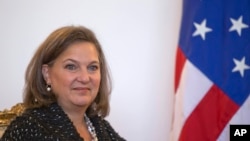Russia’s announcement that it is withdrawing forces from Syria should not lead Washington to lift sanctions against Moscow over Ukraine, U.S. Assistant Secretary of State Victoria Nuland told lawmakers Tuesday, citing recent reports of a “spike in ceasefire violations” in eastern Ukraine.
Russia President Putin announced plans on Monday to withdraw most Russian forces from Syria after a five-and-a-half-month operation.
“Because they're withdrawing or have said they're withdrawing troops in Syria, [it] should not mean that we let them off the hook in terms of sanctions vis-a-vis activities in Ukraine,” Nuland said during a Senate Foreign Relations Committee hearing.
According to monitors from the Organization for Security and Cooperation in Europe (OSCE), there were 15,000 cease-fire violations in February alone, the vast majority of which originated from the separatist-controlled side of eastern Ukraine. In addition, there were more recorded ceasefire violations in the first week of March than at any time since August 2015.
The so-called Minsk II agreement represents a package of measures to alleviate the ongoing conflict in eastern Ukraine. It also authorizes OSCE access for monitoring and verification of the cease-fire and heavy weapons withdrawal.
While noting Russia is lobbying hard inside Europe for an end to sanctions, Nuland added the U.S. continues to “look at the Syria theatre and at the Ukraine theatre as two separate places” because “what is done in Syria should not impact choices about Ukraine.”
Turning point?
Beginning in February of 2014, Russia orchestrated a military intervention and ultimately annexed Crimea a few weeks later, a move that was largely condemned by the international community which slapped Moscow with sanctions.
The EU will review its sanctions against Moscow in June.
The U.S. has been clear that for Washington to roll back sanctions against Moscow, there must be a complete implementation of the Minsk agreements. In addition, “Crimea sanctions must remain in place so long as the Kremlin imposes its will on that piece of Ukrainian land,” said Nuland during the hearing.
Ongoing fighting in eastern Ukraine has cast doubt on plans under the Minsk agreement for local elections in separatist-held areas.
“De-escalation enables decentralization, not the other way around,” regional expert from Center for Strategic and International Studies Carl Hvenmark told VOA, adding in most historic cases there has never been “an ability to deliver pragmatic reforms while there’s an open conflict.”
Nevertheless, Nuland told U.S. lawmakers that 2016 could be the turning point for the Ukraine crisis.
“If security can improve in coming weeks, if hostages are returned, if the parties can finalize negotiations on election modalities and other political issues, we could see legitimate leaders elected in Donbas by fall, the withdrawal of Russian forces and equipment, and the return of Ukraine’s sovereignty over its border before the end of the year.”
Moscow visit
Secretary of State John Kerry may further discuss the situation in Ukraine when he visits Moscow next week. State Department spokesman John Kirby said on Tuesday that Secretary Kerry is also expected to raise U.S. concerns over jailed Ukrainian female pilot Nadiya Savchenko.
Savchenko was taken hostage by Russia in 2014 and has been on a hunger strike since early March to protest the Russian criminal case against her.
The U.S. has committed over $760 million in assistance to the Kyiv government, in addition to two $1 billion loan guarantees. The Obama administration also requested $3.4 billion for the European Reassurance Initiative (ERI) to support efforts to ensure peace and security in Europe. That total is four times the amount requested last year.
But critics expressed concern that the administration has not been supporting a sufficient level of force deployment in eastern Ukraine to deter Russia aggression.
“My concern about ERI is that its implementation has been slow and gradual, it’s been consistent with Obama administration’s incrementalist approach to responding to Russian assertiveness and aggression,” Ian Brzezinski from the Atlantic Council told VOA in a recent interview.
March 18 marks two years after Russia’s annexation of Crimea.





